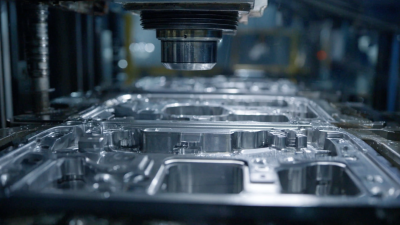 State contract manufacturing is increasingly recognized as a vital resource for small businesses aiming to enhance their production capabilities while minimizing operational costs. According to industry reports, approximately 60% of small manufacturers are turning to state contract manufacturing to access affordable, efficient production solutions that enable them to scale effectively. This collaboration not only promotes job creation within local economies but also fosters innovation by allowing small enterprises to leverage state resources and expertise. Furthermore, a recent study revealed that businesses engaging in state contract manufacturing reported a 20% increase in productivity and a significant reduction in time-to-market for new products. As such, understanding the multifaceted benefits of state contract manufacturing becomes crucial for small businesses seeking to navigate the competitive landscape and drive sustainable growth.
State contract manufacturing is increasingly recognized as a vital resource for small businesses aiming to enhance their production capabilities while minimizing operational costs. According to industry reports, approximately 60% of small manufacturers are turning to state contract manufacturing to access affordable, efficient production solutions that enable them to scale effectively. This collaboration not only promotes job creation within local economies but also fosters innovation by allowing small enterprises to leverage state resources and expertise. Furthermore, a recent study revealed that businesses engaging in state contract manufacturing reported a 20% increase in productivity and a significant reduction in time-to-market for new products. As such, understanding the multifaceted benefits of state contract manufacturing becomes crucial for small businesses seeking to navigate the competitive landscape and drive sustainable growth.
State contract manufacturing presents a significant opportunity for small businesses to enhance cost efficiency in their operations. By collaborating with state-run facilities and programs, these businesses gain access to lower production costs, which can be crucial for their competitiveness in the market. According to recent studies, small enterprises that utilize state contract manufacturing can save between 15% to 30% on production expenses compared to traditional manufacturing routes. This cost reduction primarily stems from diminished overheads, including labor and material costs, facilitated by state economies of scale.
Furthermore, engaging in state contract manufacturing allows small businesses to avoid common pitfalls associated with supply chain disruptions. A report highlighted that companies adopting such manufacturing solutions can mitigate risks effectively, as they align with state resources that often have established relationships with suppliers and logistics providers. This integrated system enhances reliability in delivery and product quality, providing small businesses with a strategic advantage in managing their expenses while ensuring a steady supply of goods to meet consumer demand. By optimally leveraging these resources, small businesses can focus on innovation and growth, rather than being bogged down by the financial burdens typically associated with production inefficiencies.

State contract manufacturers play a crucial role in enhancing product quality for small businesses, particularly in industries with stringent quality assurance requirements. These manufacturers are equipped with specialized facilities and expertise that help ensure compliance with regulatory standards. By outsourcing production to reputable state contract manufacturers, small businesses can benefit from advanced quality control processes, sophisticated testing methods, and certified environments that guarantee the integrity and safety of their products.
As the global sterility testing market is expected to grow significantly, businesses that prioritize quality assurance can gain a competitive edge. State contract manufacturers often incorporate state-of-the-art technology and processes that enhance product reliability and safety, which is vital in sectors like pharmaceuticals and biotechnology. By leveraging these manufacturers, small businesses can not only improve their product quality but also strengthen their brand reputation, ultimately leading to increased customer trust and loyalty.
Localized manufacturing offers small enterprises a unique opportunity to streamline production processes while fostering community relationships. By partnering with state contract manufacturers, small businesses can reduce lead times and enhance responsiveness to market demands. This localized approach not only minimizes shipping costs and time but also allows for greater flexibility in production schedules, which is crucial for smaller operations that may have fluctuating order volumes.
Tips: When considering state contract manufacturing, assess local manufacturers' capabilities and resources. Establishing strong communication channels can also facilitate a more efficient workflow, enabling you to adapt quickly to any changes in your production needs.
Furthermore, localized manufacturing ensures a higher degree of quality control. Being close to production sites allows for easier oversight, helping small businesses maintain product standards and reduce the likelihood of errors. This proximity often fosters a more collaborative environment, where ideas can be exchanged freely and innovations can be implemented rapidly.
Tips: Regular visits to your manufacturing partner can help build a strong relationship and ensure alignment on quality expectations. Additionally, utilizing local resources can enhance your brand's appeal by promoting sustainability and supporting the local economy.
| Benefit | Description | Impact on Small Businesses |
|---|---|---|
| Cost Efficiency | Reduced transportation costs and logistics expenses. | Enables better allocation of resources for growth. |
| Faster Turnaround Times | Localized manufacturing leads to quicker production cycles. | Improves ability to respond to market demands. |
| Quality Control | Easier oversight of production processes and standards. | Enhances product quality and customer satisfaction. |
| Flexibility and Customization | Ability to quickly adapt to changes in customer preferences. | Allows for personalized product offerings. |
| Local Economic Growth | Supports local jobs and stimulates the economy. | Creates a positive brand image within the community. |
Navigating the complexities of regulatory compliance can be a daunting task for small businesses, but state contract manufacturing offers a streamlined solution. By engaging in state contracts, small businesses can benefit from established compliance frameworks that have already met local regulations. According to a recent report by the National Institute of Standards and Technology, 70% of small manufacturers see navigating regulatory requirements as a significant barrier to growth. State contracts often come with pre-defined legal requirements, which can reduce the time and resources dedicated to compliance, allowing businesses to focus on production and innovation.
Tips: Utilize state resources to stay updated on changes in regulations that affect your business operations. Regularly check state government websites for updates or subscribe to newsletters that provide insights on compliance issues.
Moreover, state contracts can enhance a company's credibility and marketability. Being part of a state-sanctioned program indicates a commitment to high standards, which can attract more clients. Moreover, a survey by the Small Business Administration found that businesses engaged in state contracts typically report a 30% increase in revenue, largely due to the competitive advantage and reliability perceived by customers.
Tips: Establish clear communication with state agencies to ensure you fully understand the compliance requirements associated with your contracts. Leverage this relationship to gain insights on best practices and potential pitfalls.
State contract manufacturing offers small businesses a unique opportunity to expand their market reach through strategic partnerships with state entities. By leveraging these partnerships, small enterprises can access resources that significantly enhance their operational capabilities. For instance, states often provide funding, technical assistance, and access to larger supply chains, which can reduce costs and streamline production processes.

Tips: When pursuing state partnerships, businesses should thoroughly research available grants and programs specific to their industry. Networking with local government representatives can also provide insights into upcoming projects and partnership opportunities.
Furthermore, collaboration with state partners can serve as a powerful springboard for growth. By participating in state-led initiatives, small businesses can improve their visibility and credibility in the marketplace. These partnerships may unlock opportunities to innovate and diversify product offerings, aligning closely with market demands.
Tips: Small businesses should consider developing a clear value proposition that articulates how their products or services can benefit the state and its constituents, enhancing the likelihood of securing a partnership.





